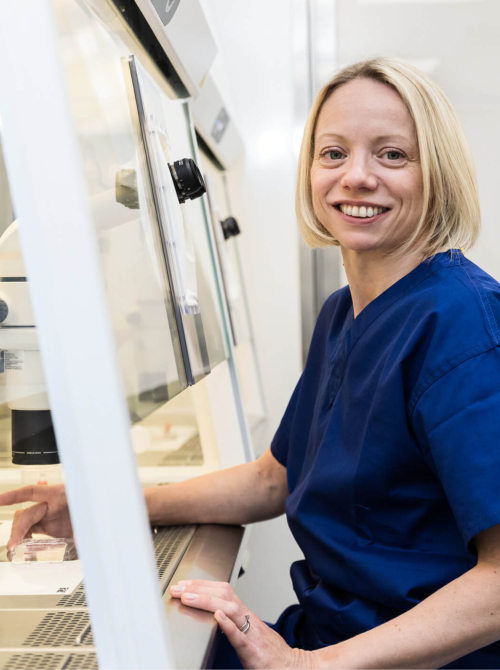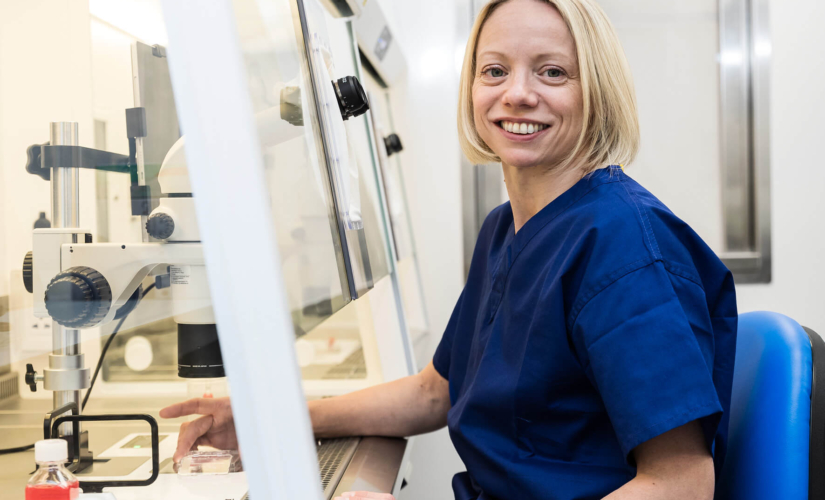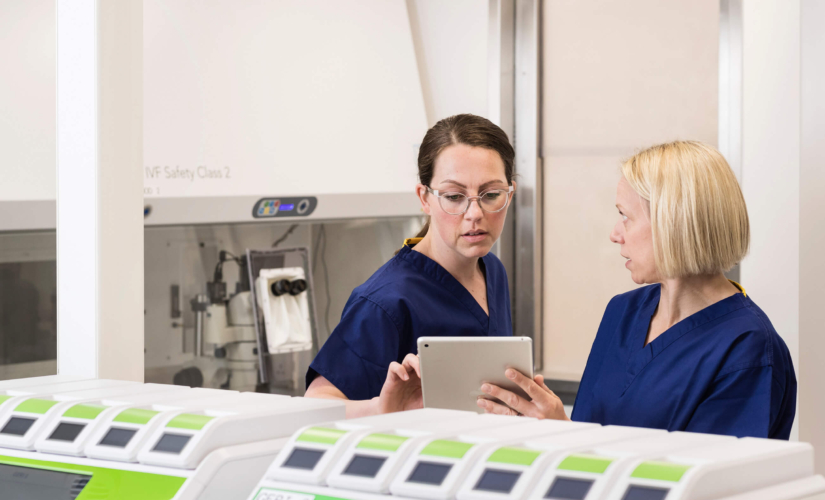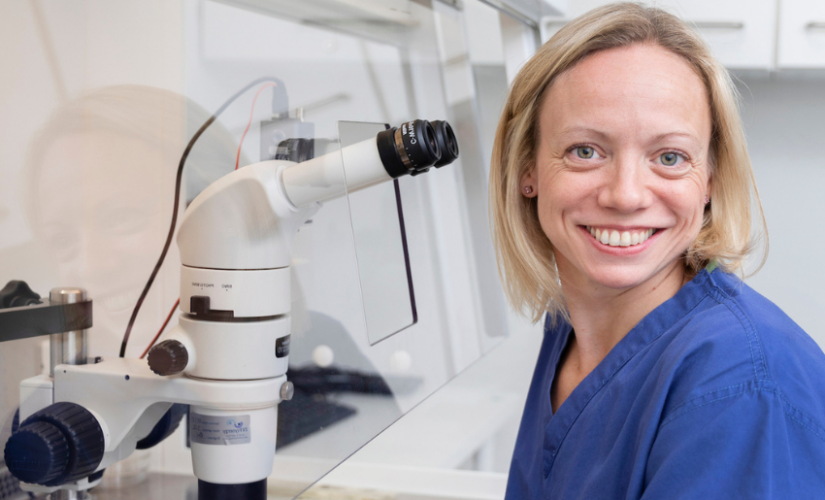All about egg freezing
Egg freezing is a great option for many people who would like a biological family of their own in the future. But, it can also be an overwhelming subject to navigate.
We look at everything from what the egg freezing process involves, important things to consider, how to prepare yourself for egg freezing and how our team can support you
Egg freezing is a great option for many people who would like a biological family of their own in the future. But, it can also be an overwhelming subject to navigate.
In this article, we’re exploring everything from what the egg-freezing process involves, important things to consider, how to prepare yourself for egg freezing and how our team can support you.
We are passionate about helping provide options for building future families. We are specialists in fertility preservation and reproductive endocrinology and work with patients on a daily basis who wish to help them freeze their eggs.
What is egg freezing?
Egg freezing, or as it’s sometimes known; social egg freezing, is in essence a ‘fertility preservation method’ that involves the cryopreservation of female human eggs.
It’s a great option for many people, including those who want children one day but aren’t quite ready to start their family just yet, or those who have a health condition that could affect their ovarian reserve.
The process involves fertility medication to stimulate your ovaries to produce multiple mature eggs, then extracting these eggs from your ovaries, freezing and storing them until you’re ready to use them.
Who is egg freezing for?
There are a lot of reasons why someone may decide to freeze their eggs to increase the chances of having their own biological children in the future. From concerns about declining fertility, not being ready to have a baby, wishing to focus on a career or maybe they just haven’t met a partner they want to start a family with yet.
There are also medical reasons to consider, such as cancer patients undergoing radiotherapy or chemotherapy treatments, anyone undergoing gender reassignment treatment or those with PCOS, endometriosis, fibroids or ovarian cysts.
If you’re considering egg freezing but not sure if it’s quite right for you, you may want to consider speaking to our fertility counsellor, who can help get all of the information you need to make the right decision for you.
What is the best age to freeze your eggs?
Age is a big consideration when deciding to freeze your eggs.
Technically, you can freeze your eggs at any age after you start your period (however we would usually recommend this as an option for anyone over 25 years of age), and before you’re in menopause. But as the egg quality and quantity decline as you get older, it not only becomes harder to get pregnant naturally, but also becomes harder to collect more viable eggs.
Female babies are born with all the eggs they’re ever going to have, and unlike sperm, no new egg cells are made during their lifetime. This means, as a woman ages, her fertility reduces due to the decreasing number and quality of the remaining eggs.
The best test to identify your ovarian reserve (or ‘egg count’ as it’s known) is by doing an AMH blood test. AMH is a hormone produced by cells from the small follicles in a woman’s ovaries and is used as a marker of egg quantity. Alongside an ultrasound to tell us your antral follicle count, we will be able to see what the likelihood of you being able to have a successful egg freezing cycle is.
A few things to consider
If you’ve made the decision to freeze your eggs, you need to ask yourself questions such as: when you would like to have your first child and how many children there are in your ideal family.
These are both really important considerations when deciding to freeze your eggs, as it may have an impact on the number of egg freezing cycles you decide to do.
Depending on your AMH levels (ovarian reserve) and age, we may recommend more than one cycle of egg collection, or consider using partner sperm, donor sperm, or even PGT-A genetic testing to ensure we have a good ‘bank’ of eggs or embryos for you to build your complete family in the future.
Should I freeze eggs or embryos?
We only believe in open and honest conversations, and this is especially important when considering treatments such as egg freezing.
During your initial consultation, the team will take time to explain the differences between freezing eggs and embryos, and which is most likely to result in a pregnancy when you are ready to start building your family.
This may mean we recommend you either involve a partner or use donor sperm to bank embryos instead of eggs.
The decision to freeze embryos rather than eggs is a really important subject to consider, and something you’ll be able to speak to both one of our fertility consultants, as well as one of our leading embryologists (this is something unique to the Evewell, and something not all clinics allow).
If you choose to freeze embryos rather than eggs, our embryologists (such as the amazing @emmatheembryologist), will take the time to explain how the process, as well as additional options, such as PGT-A, a genetic test to help improve your chances of pregnancy in the future.
What is the egg freezing process?
Freezing your eggs takes around two weeks from starting the medication, through to egg collection. It’s something you can fit into your daily life, with a few adjustments to ensure you can get to the clinic every few days.
- Step 1 – Tests and Scans
During your first meeting with a fertility consultant, it’s not only important to discuss your future plans, but you’ll also have an ultrasound scan, an AMH (ovarian reserve) blood test and a TSH (thyroid function) blood test to determine your fertility levels and how successful egg freezing will be for you.
- Step 2 – Treatment Plan
If your tests and scans come back suggesting you’re a suitable candidate for egg freezing, your consultant will then design an individualised treatment plan to deliver the best possible results for you.
You’ll then spend time with one of our fertility nurses, who will guide you through your treatment plan, show you how to use your medication and be on hand to provide you with care and support throughout your journey.
- Step 3 – Ovarian Stimulation and Monitoring
You’ll start injecting hormone medication to stimulate your ovaries, so they produce more than one mature egg per cycle.
During this phase, which usually takes around two weeks, you’ll need to attend the clinic every two to three days for ultrasound scans and blood tests to monitor the growth of the follicles.
If, following our daily patient review meeting, there are any changes to your medication your consultant wishes you to follow, one of our nurses will call you that evening with new instructions.
- Step 4 – Trigger
When your consultant thinks you’re ready for egg retrieval, you’ll be given a ‘trigger injection’ to help your eggs mature fully, getting them ready for collection.
You’ll be given an exact time to take this injection, and the timing is important as the egg retrieval will happen 36 hours afterwards. If you delay the injection, you can risk ovulating and we will be unable to collect any eggs.
- Step 5 – Egg Retrieval
Wherever possible, your consultant will perform your egg collection, working closely with the embryology team.
The egg retrieval is a relatively quick outpatient procedure, where your consultant will use an ultrasound probe to identify your viable follicles, and insert a needle into the follicles in your ovaries to suck out fluid that hopefully contains the mature eggs from your ovaries.
You’ll be sedated for the procedure and will be advised by one of our nursing team how many eggs were collected once you are in the recovery bay and awake.
We recommend feet up for the rest of the day and pain relief to manage the period-like pains that are expected after egg retrieval.
- Step 6 – Freezing and storing
Your retrieved eggs will be evaluated and cryopreserved by an embryologist the same day.
If you’re opting to create and freeze embryos, after the sperm has been prepared and fertilised with the egg, you’ll be updated by the embryology team on Day 5 as to how many embryos or blastocysts they have been able to freeze.
- Step 6 – Aftercare and egg thawing
Your frozen eggs, or embryos, will be stored in our lab to be later thawed whenever you’re ready to use them in an IVF or ICSI cycle, or an embryo transfer in the case of frozen embryos.
You’ll have a follow-up consultation with your doctor to review your treatment and when you’re ready to discuss starting your family, you’ll arrange a meeting to discuss the best plan of action for egg fertilisation, if you don’t have embryos stored, and possible investigative tests before any frozen embryo transfer to help maximise your chances of pregnancy.
What tests do I need before freezing my eggs?
If you’re considering egg freezing at The Evewell, our Female Fertility Review is a good starting point for assessing fertility and identifying any future concerns. This review includes a consultation, an ultrasound scan, an AMH (ovarian reserve) blood test and a TSH (thyroid function) blood test.
Measuring your AMH is always something we do before recommending an egg freezing cycle, as this shows us your fertility potential.
An AMH blood test measures your ovarian reserve, and is one fertility consultants use to assess a woman’s ovarian reserve or egg count. AMH is a hormone produced by cells from the small follicles in a woman’s ovaries and is used as a marker of oocyte quantity.
TSH, short for thyroid stimulating hormone, is vital for regulating metabolism. Women below the age of 50 are far more likely to develop a thyroid problem than men. A normal TSH level can help guard against infertility and conception problems (ovarian and implantation-related, mainly), miscarriage, premature birth, pre-eclampsia, low birth weight and mental problems in the baby.
The current recommendation, and something we aim for, is optimising the preconception TSH value to ≤2.5 mIU/L, which is the established goal for pregnant women. Hence, before egg freezing, TSH levels need to be considered.
How do I prepare my body for freezing my eggs?
Before commencing treatment, you’ll have an initial consultation with one of our fertility consultants, who will discuss with you the results of any tests you may have had, and then make suggestions of possible further tests, treatments or supplements to take before starting.
Read our article on how to increase fertility in your diet here, what kind of supplements you should be taking to boost your fertility, and how to increase fertility in women.
How can I fit egg freezing into my life?
At The Evewell, we do everything we can to work around your life and your cycle. Only when you’re ready, your egg freezing treatment will start.
This means no extra hormonal medication to align your cycle with our schedules, we just ask for you to call us when your period starts. This might mean more work for us, but it means less stress on your body.
We generally recommend dialling down the social activity during your cycle, avoiding smoking completely and cutting down on drinking alcohol for at least three months before your cycle to maximise your chances and ensure your body is in optimum condition.
Can I exercise whilst freezing my eggs?
When it comes to exercise, as medications given to stimulate follicle growth mean your ovaries can become enlarged and sometimes a little tender, high-impact activity can place stress on your body and may slow down this process.
We recommend when undergoing egg freezing, avoid high-intensity activities such as high-intensity interval training (HIIT), weight training and intense cardio routines intense training sessions, and instead opt for low-impact exercises, such as swimming, walking or yoga. Read our article on exercise and fertility treatment here.
Why freeze my eggs at The Evewell?
We understand that making the decision to freeze your eggs can be a big step into the unknown.
We only believe in open and honest conversations, and this is especially important when considering treatments such as egg freezing. Our team have been trained to support those wishing to freeze their eggs, ensuring sensitivity and individual circumstances are considered during appointments.
They will take the time to really understand both your current situation and how egg freezing can fit into your life, ensuring you have the best possible chance of building a biological family of your own in the future.
Unique to The Evewell is allowing all patients access to our entire team, including the embryology team, who will be fully involved in your journey, working together with your consultant to create the best plan to preserve your fertility for the future.
We offer slightly longer appointment times, to ensure you’ve been able to ask all the questions you may have. If you’re having treatment on your own, our team will always make sure no reference to a partner is made and you’re welcome to bring someone with you to your appointments.
Common FAQs for anyone interested in egg freezing
How long does egg freezing take?
- Freezing your eggs will take around two weeks from starting the medication to stimulate your ovaries, through to egg collection. From there, your eggs will be cryopreserved until you’re ready to use them.
How much does it cost to freeze eggs?
- We know that fertility treatments are not only an emotional commitment but also a financial one too, and with the ultimate goal of finding the quickest, easiest, and least invasive way to get you pregnant, we’ve made sure our prices are competitive.
- One cycle of egg freezing, including up to five scans and one year of storage is £3,815. Blood tests and medications, which will vary depending on personal requirements, are not included. Each year of storage after the first is £350.
- Click here to see a sample egg freezing cycle cost.
How long should you wait between egg freezing cycles?
- You can start a new cycle right after completing a prior cycle, so long as your baseline testing is normal. Some women choose to take a month or multiple months’ break between cycles for personal reasons, but it’s not required.
How many eggs can you freeze in one cycle?
- The number of eggs you can freeze in one cycle is limitless but is of course dependent on your ovarian reserve (i.e.: how many eggs you’ve got left), how well you respond to the medication and how successful the egg collection is. Some egg collections will, unfortunately, end up with no suitable eggs for freezing, whilst in others, you may be able to retrieve dozens of eggs.
Can you get egg freezing on the NHS?
- Unfortunately, not. The NHS will only fund egg freezing cycles for patients with medical conditions such as cancer.
I’ve got PCOS, can I freeze my eggs?
- For women with PCOS, freezing eggs at a younger age, when the eggs are estimated to be better quality and at a higher quantity, can be an excellent option. The greater number of eggs expected to be retrieved in a single cycle makes egg freezing very cost-effective for patients with PCOS.
Can I freeze my eggs if I have endometriosis?
- Endometriosis is a chronic hormonal condition which is experienced by young women in their reproductive age group, and is where uterine lining is found in the pelvis and pelvic organs.
- It tends to progress with every ovulation, so the treatment is to curb ovulation – in the form of: hormones, such as combined pills / the coil / progesterone-only pills, physiologically with pregnancy or menopause-inducing medications, or laparoscopic treatment.
- As endometriosis affects fertility, in the form of affecting the fallopian tubes and endometrial lining, ovulation, the quality of the eggs and reduced egg reserves, it is recommended to fall pregnant sooner, for anyone who has endometriosis or recommended to have fertility preservation, in the form of egg or embryo freezing.
- If you have endometriosis, freezing eggs before the ovaries are damaged by this condition offers a “real chance of future pregnancy.”





